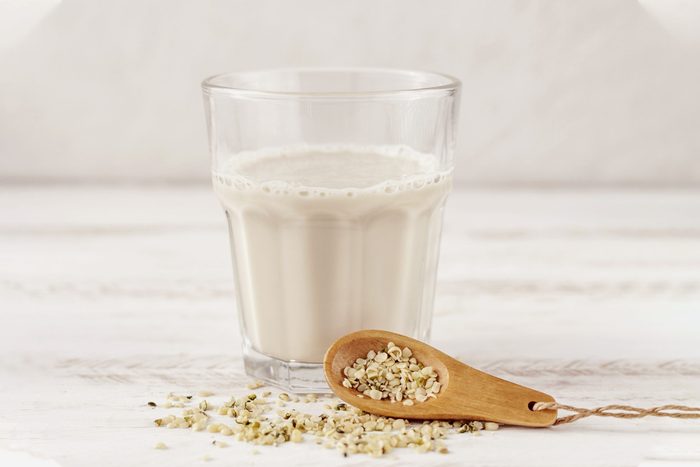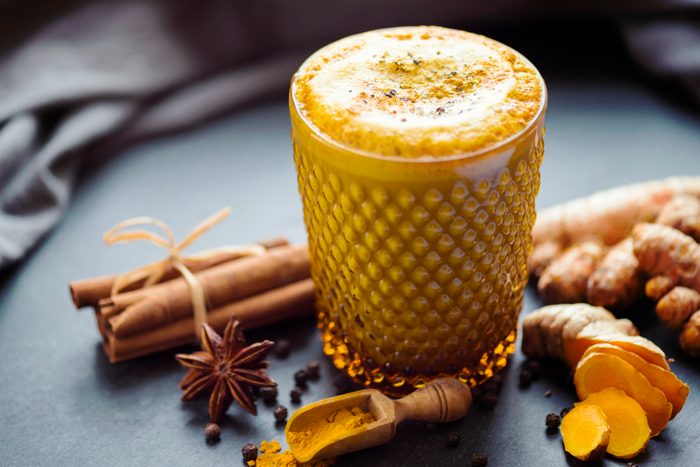Is Hemp Milk Good for You? 10 Nutrition Facts to Know

Hemp milk is a nondairy alternative to cow's milk. Learn all about its nutrition, benefits, and what to look for on the label. Plus, try a delicious recipe.
Browse supermarket shelves for milk products, and you’ll see a lot more than the stuff from a cow. Not only are there enduring plant-based favourites like soy and almond milks, but new plant milks are cropping up all the time. One you may not have heard of: hemp milk.
It’s just one more option in a lineup of nondairy milks that includes coconut milk, oat milk, and rice milk. Like the others, it’s a good plant-based alternative for your coffee, tea, or morning bowl of cereal. With nutty and earthy tones, hemp milk adds a hint of flavour to whatever you’re drinking or eating. “Hemp milk tastes delicious in coffee, tea, hot chocolate, smoothies, and oatmeal,” says Michelle Routhenstein, a cardiology dietitian and owner of Entirely Nourished in New York City.
There are so many nondairy milk options to choose from these days that it can be hard to decide among them. To help you weigh your options, we’ve reached out to nutrition experts, who explain hemp milk’s health benefits and how to use it.
What is hemp milk?
Hemp milk is derived from the seeds of the hemp plant, also known as Cannabis sativa. A blend of water and seeds creates a creamy texture and consistency. And we know what you’re thinking: Hey, doesn’t marijuana come from that plant? If that can get you high, can hemp milk? The answer is no. The hemp plant is a cousin of the Cannabis sativa plant known as marijuana, and it can only be legally grown if it contains no more than 0.3 percent tetrahydrocannabinol (THC), the compound that can get you high.
Although the plant’s leaves have minuscule amounts of THC, the seeds don’t naturally contain it at all. Drinking hemp milk won’t cause or produce the effects that marijuana can. So, no, people don’t drink hemp milk to get high. They drink it for its nutrition benefits. “Hemp milk is nutrient-dense and rich in plant proteins and healthy fats,” says registered dietitian Rachel Naar, a nutrition consultant in New York.
(Related: Hemp Hearts vs. Hemp Seeds: What’s the Difference?)
Hemp milk nutrition
There are a lot of reasons people might forego cow’s milk and choose a plant-based alternative instead. Vegans and vegetarians, in particular, rely on nondairy alternatives. But even people who make a habit of drinking dairy can appreciate the nutrition profile of hemp milk. “Hemp milk is a good source of omega-3 fatty acids and magnesium,” says Danielle Gaffen, a registered dietitian nutritionist based in California.
Our bodies need magnesium for various biochemical reactions, such as energy production and membrane transport, explains Gaffen. There are plenty of vitamins and minerals in hemp milk, and some brands may fortify it with additional minerals, upping its health factor.
Nutrition facts
Here are the nutritional benefits and percentages of recommended daily value (DV) for one cup (eight ounces) of hemp milk:
- Calories: 60
- Fat: 4.5 g (6 percent DV)
- Cholesterol: 0 mg (0 percent DV)
- Sodium: 110 mg (4 percent DV)
- Carbohydrate: 0 g (0 percent DV)
- Protein: 3 g (6 percent DV)
- Calcium: 283 mg (20 percent DV)
- Iron: 1.99 mg (10 percent DV)
- Phosphorous: 317 mg (25 percent DV)
- Potassium: 101 mg (2 percent DV)
- Zinc: 1 mg (10 percent DV)
Hemp milk benefits
Hemp seeds are full of nutritional benefits. However, there haven’t been many studies conducted on hemp milk, so it’s not clear whether the beverage can actually improve your health. “While these foods have properties that may contribute to healthy skin and/or a healthy heart, more research is needed before making definitive conclusions about hemp milk for these conditions,” says Gaffen.
Its fatty acids help lower inflammation
Linoleic acid, an omega-6 fatty acid, and alpha-linolenic acid, an omega-3 fatty acid, play critical roles in the the body, including in lowering inflammation. The downside: the body doesn’t produce them naturally, so we need to get them from food or supplements.
“Hemp milk contains a three-to-one ratio of omega-6 to omega-3 essential fatty acids,” says Gaffen. But the fatty acid profile isn’t the only reason hemp milk is considered an anti-inflammatory food. Hemp seeds contain important amino acids, such as arginine, which Routhenstein says can help lower inflammation in the body.
(Related: What You Need to Know About CBD and Inflammation)
The fatty acids boost heart health
Hemp seeds and hemp milk can be beneficial for your ticker. “Recent studies, mostly in animals, suggest that omega-3 and omega-6 fatty acids in hemp seed can improve cardiovascular health,” says Naar. Inflammation can cause problems for the heart, arteries, and circulatory system. “When an individual has chronic inflammation in their blood vessels, it leads to a buildup of cholesterol and fatty deposits in their arteries that causes narrowing of the arteries and increases their risk of heart attacks,” she says.
Anti-inflammatory properties in hemp seeds can aid the heart. Adding therapeutic anti-inflammatory components to your diet, like hemp seeds, can assist with keeping your heart healthy, says Routhenstein. But she’s quick to point out that incorporating one type of food or drink into your diet isn’t a cure-all. “Hemp milk can be a component to a heart-healthy diet, but it is not a cure or a magic pill,” says Routhenstein.
Hemp seeds are a complete protein
Amino acids are known as the building blocks of proteins and are fundamental for the body. Although there are 20 types of amino acids, nine are considered essential. Any food that contains all nine essential amino acids is considered a complete protein.
Most sources of complete protein come from animals, which makes getting enough complete protein tricky for anyone following a vegetarian, vegan, or plant-based diet. That’s why it’s such good news that hemp can fill in protein gaps. “The protein found in hemp is a complete protein, one of the few plant-based proteins that are complete,” says Gaffen.
It’s a good choice for people with allergies
While other milks can pose issues for people with certain food allergies, pretty much anyone can enjoy hemp milk. “Hemp milk is a great alternative for those with gluten, nut, and soy allergies,” says Gaffen.
It’s an alternative for people who can’t have dairy
If you are lactose intolerant, allergic to cow’s milk, or follow a diet that limits animal products, hemp milk can be a wonderful substitute.
The downside of hemp milk
While hemp milk is generally safe, there are some nutritional downsides to consider.
It has less protein than dairy milk
In head-to-head comparison with cow’s milk, hemp milk comes up short. Though it’s a source of complete protein, it doesn’t have a ton of it. “Hemp milk is great to add to your diet, but it does not contain adequate protein, so it shouldn’t be used as a comparable protein substitute for cow’s milk,” says Routhenstein. Not only is it low in protein, but it’s also low in minerals and vitamins that dairy milk has. “Hemp milk lacks certain nutrients that other milks have, such as calcium, vitamin D, and vitamin B12,” says Gaffen. “However, it is getting more common to find fortified hemp milk in stores.”
The bottom line: it’s a great alternative if you’re unable to drink cow’s milk, but don’t expect quite the nutritional punch. Check the label to see if it’s fortified with the nutrients that are important to you.
(Related: What Is Plant-Based Protein and How to Add More to Your Diet)
It might contain additives
When choosing different brands of hemp milk, it’s also a good idea to read the label so you know what other things you’re drinking. Not all plant-based milks are made the same way, and some may have additional (and unwanted) ingredients, such as added sugar, thickeners, and preservatives.
“Some hemp milks contain phosphorus additives, like disodium phosphate, and thickeners, like carrageenan, that may promote inflammation,” says Routhenstein. “Opt for versions that do not contain these ingredients for a heart-healthier version.”
How to use hemp milk
Drinking hemp milk or pouring it into beverages is a no-brainer. Just use it like dairy milk in coffee, tea, and smoothies. If you want to go beyond beverages, you’re in luck. Hemp milk can be used as cow’s milk substitute in recipes. Thanks to its nutty flavour, it pairs well with different meals. “I recommend trying hemp milk in savoury dishes, as its taste may be too strong for desserts or sweet dishes,” says Gaffen.
Consider adding it to curries or as a soup topper for a creamy finishing taste, says Routhenstein. “I love adding hemp milk to rolled oats with a scoop of protein powder, bananas, blueberries, and crushed walnuts for a nutty, creamy bowl of breakfast goodness,” she says.
Curious about using hemp milk? Try Gaffen’s delicious hemp milk latte recipe, below.

Golden hemp milk latte
Serves: 1
Time: 7 minutes
Ingredients:
- 1 cup hemp milk
- 1 Tbsp maple syrup
- 1 tsp ground turmeric
- Pinch black pepper
- 1/4 tsp ground cinnamon
- 1/8 tsp ground ginger
- 1/2 tsp vanilla extract
Directions:
- Bring the hemp milk to a boil and then reduce it to a simmer.
- Add in the maple syrup, spices, and vanilla extract.
- Whisk until the spices are well incorporated.
- Serve immediately.
Next: Want to Add Hemp Seeds to Your Diet? Here’s What You Need to Know




